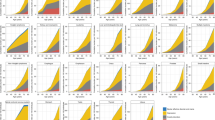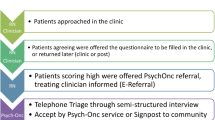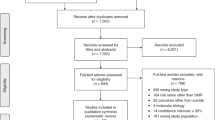Abstract
Psychiatric morbidity in patients with cancer is high and without appropriate treatment unremitting. We assessed the ability of 143 doctors to establish the psychological status of 2297 patients during outpatient consultations in 34 cancer centres and hospitals in the UK. Prior to seeing the doctor, consenting patients completed a short self-report questionnaire (GHQ12), designed for the psychological screening of large populations. At the end of the consultation, doctors completed visual analogue scales rating patients’ distress. 837/2297 (36.4%) patients had GHQ scores suggestive of psychiatric morbidity. The doctors’ sensitivity (true positive rate) was 28.87% (SD 25.29), specificity (true negative rate) 84.79% (SD 17.44). The misclassification rate was 34.7% (SD 13.79) meaning that for 797 patients the wrong assessment was probably made. These data show that much of the probable psychiatric morbidity experienced by patients with cancer goes unrecognized and therefore untreated. Doctors need communication skills training to elicit problems during consultations. Appropriate referrals to psychological services are necessary when patients requiring help are identified and ought to be an integral part of cancer care. © 2001 Cancer Research Campaign
Similar content being viewed by others
Article PDF
Change history
16 November 2011
This paper was modified 12 months after initial publication to switch to Creative Commons licence terms, as noted at publication
References
Baile W, Kudelka AP, Beale EA, Glober GA, Myers MA, Greisinger AJ, Bast RC, Goldstein MG, Novack D and Lenzi R (1999) Communication skills training in oncology. Cancer 86: 887–897
Breitbart W (1995) Identifying patients at risk for, and treatment of major psychiatric complications of cancer. Support Care Cancer 3: 45–60
Carney PA, Eliassen MS, Wolford GL, Owen M, Badger LW and Dietrich AJ (1999) How physician communication influences recognition of depression in primary care. J Fam Pract 48: 958–964
Cella DF, Mahon SM and Donovan MI (1990) Cancer recurrence as a traumatic event. Behav Med 16: 15–22
Derogatis LR, Morrow GR, Fetting J, Penman D, Piasetsky S, Schmale AM, Henrichs M and Carnicke CL Jr (1983) The prevalence of psychiatric disorders among cancer patients. JAMA 249: 751–757
Fallowfield LJ (1988) The psychological complications of malignant disease. Medical Complications of Malignant Disease, Kaye SB and Rankin EM2 (2): (July 1988). 461–478, Bailliere’s Clinical Oncology: International Practice and Research, Balliere Tindall: London
Fallowfield LJ (1990). The Quality of Life: The Missing Measurement in Health Care, Souvenir Press: London
Fallowfield LJ (1995) Psychosocial interventions in cancer. BMJ 311: 1316–1317
Fallowfield LJ and Hall A (1994) Psychological effects of being offered choice of surgery for breast cancer. BMJ 309: 448
Fallowfield LJ, Hall A, Maguire GP and Baum M (1990) Psychological outcomes of different treatment policies in women with early breast cancer outside a clinical trial. B M J 301: 575–580
Fallowfield LJ, Lipkin M and Hall A (1998) Teaching senior oncologists communication skills: results from phase 1 of a comprehensive longitudinal program in the UK. J Clin Oncol 16: 1961–1968
Ford S, Fallowfield LJ and Lewis S (1994) Can oncologists detect distress in their out-patients and how satisfied are they with their performance during bad news consultations?. B J Cancer 70: 767–770
Ford S, Fallowfield LJ and Lewis S (1996) Doctor-patient interactions in oncology. So Sci Med 42: 1511–1519
Gerrity MS, Cole SA, Dietrich AJ and Barrett JE (1999) Improving the recognition and management of depression: is there a role for physician education?. J Fam Pract 48: 949–957
Goldberg D and Williams P (1988). A User’s Guide to the General Health Questionnaire, NFER-Nelson: Windsor
Goldberg DP, Jenkins L, Millar T and Faragher EB (1993) The ability of trainee general practitioners to identify psychological distress among their patients. Psychol Med 23: 185–193
Hall A, Fallowfield LJ and A’Hern RP (1996) When breast cancer recurs: a 3-year prospective study of psychological morbidity. The Breast J 2: 197–203
Hardman A, Maguire P and Crowther D (1989) The recognition of psychiatric morbidity on a medical oncology ward. J Psychosom Res 33: 235–239
Heaven CM and Maguire P (1997) Disclosure of concerns by hospice patients and their identification by nurses. Palliat Med 11: 283–290
Hopwood P and Stephens RJ (2000) Depression in patients with lung cancer: prevalence and risk factors derived from quality-of- life data [In Process Citation]. J Clin Oncol 18: 893
Hopwood P, Howell A and Maguire P (1991) Screening for psychiatric morbidity in patients with advanced breast cancer: validation of two self-report questionnaires. B J Cancer 64: 353–356
Maguire GP, Lee EG, Bevington DJ, Kuchemann CS, Crabtree RJ and Cornell CE (1978) Psychiatric problems in the first year after mastectomy. BMJ 1: 963–965
Maguire P (1999) Improving communication with cancer patients. Eur J Cancer 35: 2058–2065
Massie MJ and Holland JC (1990) Depression and the cancer patient. J Clin Psychiatry 51 Suppl: 12–7; discussion 18–19
Meyer TJ and Mark MM (1995) Effects of psychosocial interventions with adult cancer patient: a meta analysis of randomised experiments. Health Psycho 14: 101–108
Newell S, SansonFisher RW, Girgis A and Bonaventura A (1998) How well do medical oncologists’ perceptions reflect their patients’ reported physical and psychosocial problems? – Data from a survey of five oncologists. Cancer 83: 1640–1651
Passik SD, Dugan W, McDonald MV, Rosenfeld B, Theobald DE and Edgerton S (1998) Oncologists’ recognition of depression in their patients with cancer. J Clin Oncol 16: 1594–1600
Ramirez AJ, Graham J, Richards MA, Cull A, Gregory WM, Leaning MS, Snashall DC and Timothy AR (1995) Burnout and psychiatric disorder among cancer clinicians. Br J Cancer 71: 1263–1269
Ramirez AJ, Graham J, Richards MA, Cull A and Gregory WM (1996) Mental health of hospital consultants: the effects of stress and satisfaction at work. The Lancet 347: 724–728
Roter DL, Hall JA, Kern DE, Barker LR, Cole KA and Roca RP (1995) Improving physicians’ interviewing skills and reducing patients’ emotional distress. A randomized clinical trial. Arch Intern Med 155: 1877–1884
Sellick SM and Crooks DL (1999) Depression and cancer: an appraisal of the literature for prevalence, detection, and practice guideline development for psychological interventions. Psychooncology 8: 315–333
Sheard T and Maguire P (1999) The effect of psychological interventions on anxiety and depression in cancer patients: results of two meta-analyses. Br J Cancer 80: 1770–1780
Stewart MA (1996) Effective physician-patient communication and health outcomes: a review. Can Med Assoc J 152: 1423–1433
Velikova G, Wright EP, Smith AB, Cull A, Gould A, Forman D, Perren T, Stead M, Brown J and Selby PJ (1999) Automated collection of quality-of-life data: a comparison of paper and computer touch-screen questionnaires. J Clin Oncol 17: 998–1007
Whippen DA and Canellos GP (1991) Burnout syndrome in the practice of oncology: results of a random survey of 1000 oncologists. J Clin Oncol 9: 1916–1920
Author information
Authors and Affiliations
Additional information
Lesley Fallowfield designed the study. All authors contributed to the collection and analysis of data and the writing of the report.
Rights and permissions
From twelve months after its original publication, this work is licensed under the Creative Commons Attribution-NonCommercial-Share Alike 3.0 Unported License. To view a copy of this license, visit http://creativecommons.org/licenses/by-nc-sa/3.0/
About this article
Cite this article
Fallowfield, L., Ratcliffe, D., Jenkins, V. et al. Psychiatric morbidity and its recognition by doctors in patients with cancer. Br J Cancer 84, 1011–1015 (2001). https://doi.org/10.1054/bjoc.2001.1724
Received:
Revised:
Accepted:
Published:
Issue date:
DOI: https://doi.org/10.1054/bjoc.2001.1724
Keywords
This article is cited by
-
Effect of sex on psychological distress and fatigue over time in a prospective cohort of cancer survivors
Journal of Cancer Survivorship (2024)
-
A patient perspective on applying intermittent fasting in gynecologic cancer
BMC Research Notes (2023)
-
Behavioral activation for depression in patients with advanced cancer: study protocol for a multicenter randomized controlled trial
BMC Cancer (2023)
-
Concerns raised by people treated for head and neck cancer: a secondary analysis of audiotaped consultations in a health services follow-up clinic
Supportive Care in Cancer (2023)
-
Predictors of psychiatric comorbidity in cancer patients at the time of their discharge from the hospital
Social Psychiatry and Psychiatric Epidemiology (2022)



